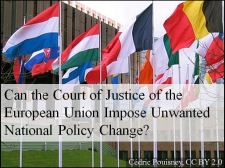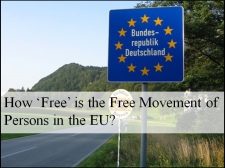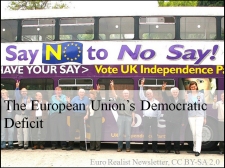Analysis by Louis VIS (Traduction Française)
The European Commission, or Commission for short, is of one the main supranational institutions in the European Union (EU) and has its headquarters in Brussels. It consists of about 25,000 civil servants and a staff of 28 Commissioners who are sent by each Member State on five-year contracts. Overall, the Commission has four main roles within the EU. It has the power to initiate legislation; it acts as the guardian of EU treaties, and therefore supervises each Member State to make sure that they correctly implement and conform to EU law; it manages the EU’s budget and spending programmes (in conjunction with national governments); and it represents the EU internationally in specific areas such as trade (e.g. WTO). However, one would be wrong in thinking that the Commission’s powers are unlimited.
In his paper Delegation, Agency and Agenda Setting in the European Community*, Mark Pollack helps us identify the key variables influencing the Commission’s formal agenda-setting power. He suggests that the Commission will only enjoy high agenda-setting powers under ‘circumstances where it enjoys the exclusive right of initiative, where it is easier to adopt than to amend a Commission proposal, where differences in Member States’ preferences can be effectively exploited, and where Member States are dissatisfied with the status quo and impatient to implement a new policy’. Indeed, the Commission is only allowed to act according to EU treaty rules, which, it is worth reminding, are drawn up by Member States themselves. Overall it is clear that for the European Commission to achieve very strong formal agenda-setting powers, a huge amount of circumstances have to be fulfilled. This ultimately suggests that the Commission can only rarely be seen as the most powerful agenda-setter in the EU.

With regards to the European Commission’s informal agenda-setting powers, we notice that these too are highly conditional. Indeed, Pollack suggests that the Commission’s powers are highest when the distribution of information between Member States and the Commission is imperfect, when there is high uncertainty about future developments, when the consequence of a proposal is smaller than any other alternative, when both the waiting and negotiation costs of finding an alternative policy are high, and when it manages to rally support of its proposal through the use of subnational actors. Therefore, once again it seems that the European Commission’s informal agenda-setting powers are highly constrained when compared to the Council or European Parliament.
As a result of these limitations, the Commission regularly produces ‘communications’ that outline initiatives and essentially ask the Council and European Parliament (EP) for the green light to make legal proposals that will subsequently constrain the Member States. The Climate and Energy Policy Framework for 2030 is a good example of this method. Indeed, whilst the Commission made a formal ‘communication’ on 23rd January 2014 to the Council and the Parliament, the issue was only extensively discussed and agreed at the European Council’s meeting last October. It was only once the European Council drew its own conclusions on the matter that it gave the Commission the go-ahead to make legal proposals, within the limits set during the European Council meeting. Such a consultative process is a good example of how the Commission may seek to increase its own agenda-setting power. However, it is obvious that the Commission’s powers are still severely constrained. Indeed, not only does it have to work within a set of conditions imposed by the European Council, but both the Council and the EP are allowed to veto the Commission’s legal proposal once it is made (although this is unlikely if the Eruopean Council has already given an initiative its blessing). This once again highlights the Commission’s limited power. Ultimately both the Council, which is made up of democratically elected political leaders from all 28 Member States, and the EP, which is democratically elected by European citizens every five years, can be seen as the EU’s most powerful institutions. Furthermore this process also demonstrates that the so-called ‘democratic deficit‘ of the EU is nowhere near as blatant as is currently described by Eurosceptic politicians and media.
To quote a former Head of Cabinet in the European Commission: ‘Some (including myself) would see the European Council as being the highest body giving direction, as the Commission only sets the agenda within the limits set by the Council’s preference’. It is quite clear that although the European Commission’s agenda-setting powers are significant, they are also highly limited. Ultimately this does not come as much of a surprise if you consider the fact that the Commission is only half the size of Birmingham City Council.
*Pollack, M. 1997. ‘Delegation, Agency, and Agenda Setting in the European Community’. International Organisation, Vol. 51, No. 1, pp. 99-134.
RELATED ARTICLES:






Incredible article! It helped clear a lot as I am writing an essay on the EU’s decision making process. Cheers!
LikeLike
their body is actually supposed to function when it’s working
LikeLike
I will appreciate if you continue this in future. Numerous folks can be benefited out of your writing. Cheers!|
LikeLike
Hi,
Thank you ever so much and your feedback is very much appreciated.
Regards,
Louis
LikeLike
Hi! Do you use Twitter? I’d like to follow you if that would be ok.
LikeLike
Hi,
Yes indeed! My twitter account is: @louis_vis1 and the twitter account for the blog is: @youngeuropeans.
LikeLike
Just bookmarked your blog, it is a really great and helpful piece of info. I am happy that you shared this helpful info with us. Please stay us up to date like this. Keep writing.
LikeLike
Thank you very much for your positive feedback it is very much appreciated and I hope you enjoy all of our coming articles. We publish two updates every Wednesday morning so make sure to keep an eye out. To make it easier you can also subscribe to our blog and you will be sent an email notification every time we publish something new.
LikeLike
Well done Louis, di I know that Head of Cabinet?
LikeLike
Thank you very much and yes you do!
LikeLike